In this article:
Blood pressure is the force with which blood moves through the circulatory system. A high blood pressure means that the force of the blood with which it is circulating is too high. A blood pressure reading of 140/90 mm Hg is considered too high. (1)

While hypertension can affect anyone, pregnant women are at an increased risk.
A study published in the journal Hypertension stated that high blood pressure, which complicates approximately 10% of all pregnancies, remains a major cause of morbidity and mortality for both mother and fetus. (2)
Types of High Blood Pressure Conditions During Pregnancy
During pregnancy, women can suffer from different types of high blood pressure conditions, such as the following: (1)
- Gestational hypertension that develops after 20 weeks of pregnancy
- Chronic hypertension that was present before pregnancy or that occurs before 20 weeks of pregnancy
- Chronic hypertension with superimposed preeclampsia that occurs in women with chronic high blood pressure before pregnancy
- Preeclampsia, a type of pregnancy complication characterized by high blood pressure and signs of damage to another organ system
Causes of High Blood Pressure During Pregnancy
There are several possible causes of high blood pressure during pregnancy, as listed below:
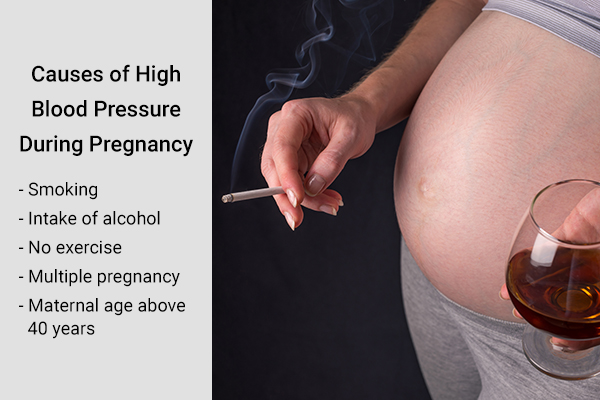
- Overweight or obesity – According to a study published in the Journal of Health, Population and Nutrition, pre-pregnancy obesity, excessive gestational weight gain, and increased intake of energy act as potential risk factors for developing gestational hypertension. (3)
- Sedentary lifestyle – Studies have shown that women who are physically more active during pregnancy tend to have a lower risk of preeclampsia, while women with increased levels of sedentary activity are at increased risk. (4)
- High blood pressure before conception – Women with hypertension before pregnancy continue to have this condition during this pregnancy. Moreover, when a woman has pre-existing hypertension or happens to develop hypertension before the 20th week of pregnancy, it is called chronic hypertension. (5)
- Assisted technique pregnancy, such as IVF – Using assistive technologies, such as in vitro fertilization, during the conception process also increases the risk of high blood pressure in a pregnant woman, according to a study published in the Journal of Experimental and Therapeutic Medicine. (6)
Other causes include the following:
- Smoking
- Intake of alcohol
- No exercise
- Multiple pregnancy
- Maternal age above 40 years
- First pregnancy
- Family history
- High levels of stress
Symptoms of High Blood Pressure During Pregnancy
The following symptoms are associated with high blood pressure during pregnancy:
- Swelling in the hands and face
- Rapid weight gain
- Unusual headaches
- Blurred vision
- Spots or stars in front of the eyes
- Pain in the upper-right side of the abdomen
Dealing With High Blood Pressure During Pregnancy
Here are some ways to lower your high blood pressure during pregnancy.
1. Monitor your salt intake
Generally, when people with high blood pressure cut back on salt, their blood pressure falls. It even prevents blood pressure from rising.
A 2014 study published in Electrolytes & Blood Pressure shows that a reduction in dietary salt intake can decrease the number of deaths from hypertension, cardiovascular disease, and strokes. (7)
A 2016 study by McMaster University found that low-salt diets may actually increase the risk of cardiovascular disease and death compared with average salt consumption. The research suggests that the only people who need to worry about reducing sodium in their diet are those with hypertension who have high salt consumption. (8)
Always remember that the body needs a small amount of sodium to work properly, but excess salt will only increase your blood pressure and your risk for heart disease or stroke. (9)
During pregnancy, you must keep a check on your salt intake to keep your blood pressure under control.
- Do not add a lot of salt to foods. Use herbs and spices instead to add flavor to your dish.
- Avoid processed foods, fast food, and sports drinks, which are high in sodium even if they don’t taste salty.
- Avoid canned foods as they are often high in sodium.
2. Try controlled breathing
Deep breathing is a popular relaxation technique that helps lower your stress levels and stabilize your blood pressure.
A study published in 2005 in Hypertension found that slow breathing improves arterial baroreflex sensitivity and is potentially beneficial in managing high blood pressure. (10)
Moreover, every time you take in a deep breath, the well-oxygenated blood gets delivered to each and every cell in the body. This, in turn, provides energy and makes you feel good overall.

How to do:
- Lie down comfortably, tilting your body to one side.
- Place your hands on your chest and below the rib cage.
- Slowly inhale through your nose so that you feel your stomach move up.
- Slowly exhale through your mouth by counting to 5, while keeping the abdominal muscles tight.
- Repeat 10 times and keep your breathing regular and slow.
- Practice deep breathing for 10 minutes, 2 or 3 times a day, to manage your blood pressure and keep your heart healthy.
3. Enjoy walking
Inactive women are at a higher risk of hypertension during pregnancy than those who exercise. One of the best cardiovascular exercises for pregnant women is walking.
A study detected a strong trend that 10 weeks of moderate exercise lowered the diastolic blood pressure among pregnant women at risk of hypertensive disorders. The reductions were probably due to the effect of exercise itself, and not due to weight or overall daily physical activity levels. (11)
Walking for 30 to 45 minutes on a daily basis is a safe activity to continue throughout all nine months of the pregnancy.
Also, walking is one of the best ways to start exercising if you were fairly inactive before getting pregnant. Start with a slow walk and gradually increase your pace as well as the duration, from 20 to 60 minutes.
As an added bonus, regular walking ensures that you are strong and have lots of endurance when it is time for delivery.
4. Increase your potassium intake
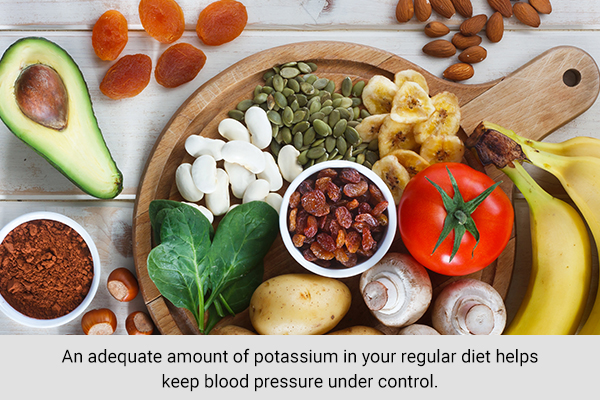
Potassium is an important mineral during pregnancy. It helps maintain your fluid and electrolyte balance. Further, it aids in the transmission of nerve impulses (12) and contraction of muscles. (13)
There are studies that suggest that pregnancy with preeclampsia and high dietary salt along with low potassium intake may have greater maternal and neonatal morbidity risk than pregnancy with preeclampsia under low dietary salt and high potassium intake. (14)
Hence, an adequate amount of potassium helps keep your blood pressure under control. It is, actually, recommended that potassium-rich foods be part of a hypertension-management diet, whether you are pregnant or not. (15)
A 2015 study published in the Journal of Human Hypertension reports that increased potassium intake, on top of a relatively low-sodium diet, had a beneficial effect on blood pressure. (16)
A pregnant woman should aim for 2,000 to 4,000 mg of potassium a day.
Some of the best potassium-rich foods are sweet potatoes, tomatoes, orange juice, potatoes, bananas, kidney beans, peas, cantaloupe, honeydew melon, and dried fruits such as prunes and raisins.
5. Eat magnesium-rich foods
A diet low in magnesium may lead to high blood pressure. A 1991 study published in Obstetrics & Gynecology reports that magnesium appeared to be beneficial in the management of pregnancy‐induced hypertension. (17)
Another study published in 2011 in the Journal of the Indian Medical Association found that patients with gestational hypertension had significantly low mean magnesium levels. (18)
This is why you should include magnesium-rich foods in your diet during pregnancy. Along with lowering your blood pressure, this mineral will help prevent the uterus from contracting prematurely. It also helps build strong teeth and bones in your baby.
The best way to get your daily dose of magnesium is through a healthy diet. You can get magnesium from foods such as almonds, avocados, bananas, beans, pumpkin seeds, tofu, soy milk, cashews, potatoes (with the skin), yogurt, blackstrap molasses, whole grains, and green leafy vegetables.
6. Practice prenatal yoga
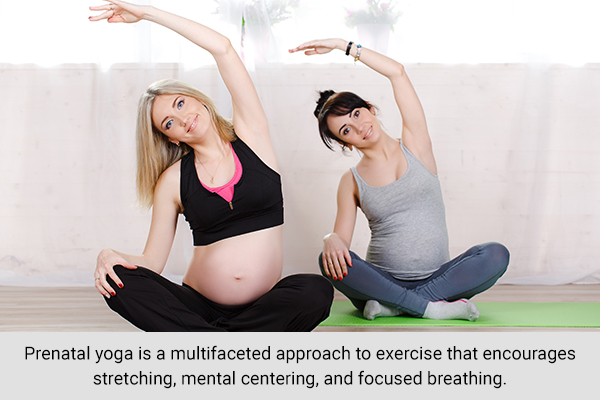
Prenatal yoga is one of the best ways to keep your stress level under control. One of the causal factors of elevated blood pressure is stress, regardless of whether you are pregnant or not. (19)
Stress during pregnancy has been linked to premature birth, low birth weight, and increased developmental and behavioral problems in the child. (20)
Prenatal yoga is a multifaceted approach to exercise that encourages stretching, mental centering, and focused breathing. Aside from reducing stress, it can improve sleep; increase the strength, flexibility, and endurance of muscles needed for childbirth; and reduce lower back pain.
A 2014 study published in Depression and Anxiety shows that yoga can help keep expectant mothers stress-free.
Women who attended a yoga class each week for eight weeks had decreased anxiety scores compared with those in the control group who received normal antenatal treatment. (20)
When it comes to prenatal yoga, it is highly recommended to join a yoga class.
7. Monitor your weight
Some amount of weight gain during pregnancy is normal, but if your weight gain is excessive, take it as a warning sign.
A 2013 study published in the American Journal of Obstetrics and Gynecology reports that gestational weight gain is a risk factor for hypertensive disorders during pregnancy. In fact, weight gain in early pregnancy may be a potential target for interventions aimed at reducing the risk of hypertension. (21)
Obesity or excessive weight gain during pregnancy has been known to cause serious impact on maternal, fetal, and neonatal outcomes. Metabolic syndrome, cardiovascular disease, and diabetes are known to result from weight gain in women following childbirth, which is caused due to preconceptional obesity and excessive weight gain during pregnancy. (22)
Through a healthy diet and a proper exercise routine, you can achieve a healthy weight. Talk to your doctor about the weight that’s right for you and follow the instructions given by your doctor.
8. Listen to music
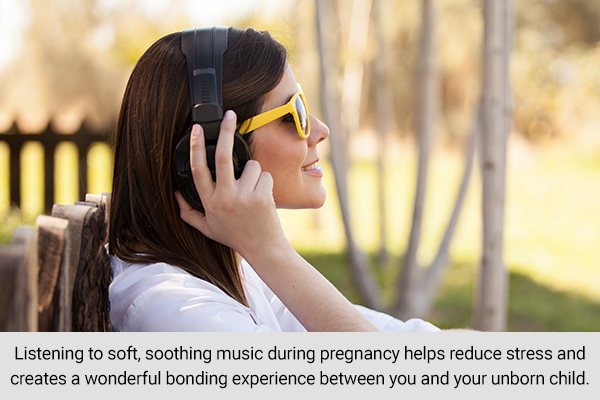
Music has a calming effect on your body, reducing stress and anxiety. (23) Listening to the right type of music for at least 30 minutes, 2 or 3 times a day, can lower your blood pressure.
As an added bonus, music can help you deal with stress and anxiety, which can make things more complicated during pregnancy. Stress is also not good for your unborn baby.
Slow-tempo and low-pitch music, without lyrics or loud instrumentation, can calm people down, even during highly stressful times.
Listening to soft and soothing music during pregnancy also helps create a wonderful bonding experience for you and your baby. Plus, it enhances the stimulation of your unborn baby’s growing brain and improves sleeping patterns for a newborn baby.
Preventing High Blood Pressure During Pregnancy
Although some causes of high blood pressure like family history or age-related issues cannot be controlled, there are some steps that can be taken to reduce the chance of developing high blood pressure during pregnancy.
- Maintain a healthy weight – Try to start your pregnancy at a healthy weight. This way, when you gain weight during pregnancy, you can work with your doctor to make a plan considering your weight, height, and lifestyle to keep your weight within a safe target.
- Exercise – Include light activities, such as walking and yoga, to keep yourself physically active and reduce the chance of hypertension during pregnancy.
- Visit the doctor regularly – Regular prenatal visits are crucial to keep a check on the developing pregnancy.
- Quit smoking and alcohol – To ensure a healthy pregnancy and healthy baby, quit smoking and alcohol.
- Avoid excess salt – Excess salt can result in an increase in your blood pressure, so limit the amount of salt you consume.
- Reduce stress – Try to avoid being stressed and being anxious during pregnancy as these would result in increased blood pressure.
Complications Caused Due to High Blood Pressure During Pregnancy
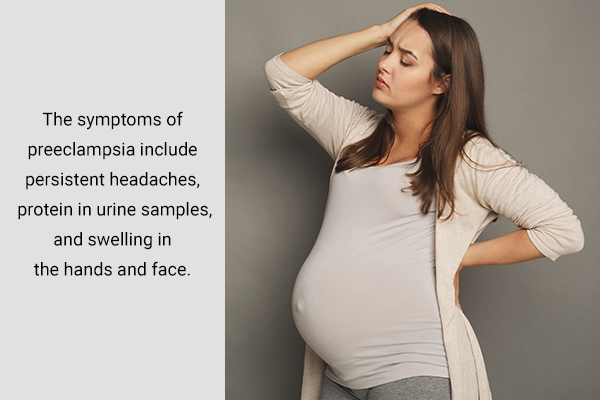
Hypertension during pregnancy can lead to other complications, which include the following:
- Preeclampsia – In this condition, serious damage is caused to other organs, such as the kidneys and brain. If preeclampsia is accompanied by seizures, it is known as eclampsia, which can be fatal. The symptoms of preeclampsia include persistent headaches, protein in urine samples, and swelling in the hands and face. In case of any symptoms of preeclampsia, immediate medical attention is required by the mother.
- HELLP Syndrome – HELLP stands for hemolysis, elevated liver enzymes, and low platelet count. This rare condition is accompanied by other symptoms, including nausea, vomiting, headache, and upper abdomen pain. In case of any symptom, immediate medical attention is required.
- Along with these, other complications may include fetal growth restriction, preterm delivery, placental abruption, and cesarean delivery. (24)
Additional Tips to Deal With Hypertension During Pregnancy
- Get early and regular prenatal medical care. If your doctor says you need medicine to keep your blood pressure under control, be sure to take it every day as prescribed.
- Those who are at high risk for preeclampsia may have to take low-dose aspirin to help prevent it. This will be advised by your doctor.
- Don’t stop taking any medicine without talking to your doctor.
- Smoking and drinking put stress on your heart and cardiovascular system. It is also dangerous to your baby’s health. Say no to smoking and drinking while you are pregnant.
- Avoid caffeine during pregnancy, as it has been linked to reduced placental blood flow and the risk of miscarriage.
Consulting Doctor and Managing High Blood Pressure
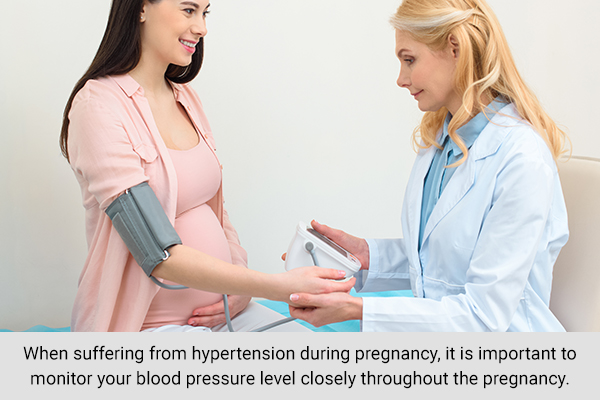
It is strictly recommended to regularly visit your doctor for prenatal visits for a healthy pregnancy. Also, monitor your blood pressure regularly, and consult your doctor immediately in case of spikes in blood pressure or any signs and symptoms that have been discussed above.
When suffering from hypertension during pregnancy, it is important to monitor your blood pressure level closely throughout the pregnancy. One way to ensure a healthy pregnancy and healthy baby is managing your blood pressure. (25)
At the same time, ultrasound exams should be done frequently to track the growth of the baby in the womb.
Expert Answers (Q&A)
Answered by Dr. Anneliese Perkins, MBBS (Obstetrician)
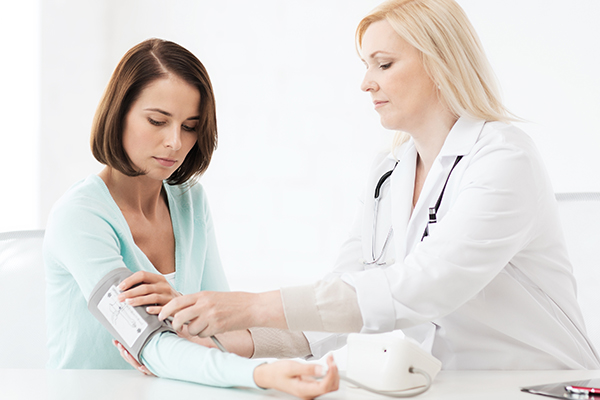
High blood pressure which is well controlled generally does not increase the risk of miscarriage. However, certain antihypertensive medications are associated with an increased risk of birth defects. These include angiotensin-converting enzyme (ACE) inhibitors or angiotensin II receptor blockers (ARBs) and Thiazide diuretics. These should be changed to safer antihypertensives prior to pregnancy.
The majority of women with controlled chronic hypertension will, under close supervision and appropriate management, have a successful outcome. Poorly controlled hypertension in the first trimester will significantly increase maternal and fetal morbidity and mortality.
The chance of needing a cesarean section is higher in women with hypertension. The choice for cesarean birth or induction of labor is dependent upon the severity of the maternal disease, gestational age, and the fetal condition. Many women are able to safely achieve vaginal delivery.
Blood pressure is considered to be elevated with a systolic blood pressure of greater than or equal to 140 mm Hg and/or diastolic blood pressure of greater than or equal to 90 mm Hg. Severe hypertension is present in pregnant women with blood pressure greater than or equal to 160mm Hg systolic or 110 mm Hg diastolic.
All women with an SBP ≥ 160 mm Hg or a DBP ≥ 110 mm Hg should be treated because of the risk of intracerebral hemorrhage and eclampsia. Treatment for mild to moderate hypertension is more controversial.
Medications used will depend on local practice, however commonly used medications include Methyldopa, Labetolol, and Nifedipine.
Salt restriction does not play a role. Advice on rest, exercise and work to women with chronic hypertension or at risk of hypertensive disorders during pregnancy is the same as healthy pregnant women. Women with superimposed pre-eclampsia may be advised to reduce exercise and work, and rest more.
Pre-eclampsia is a variable condition ranging from mild to life-threatening. Pre-eclampsia increases the risk of premature delivery (1 in 6 born before 32 weeks gestation), placental abruption, fetal growth restriction, and stillbirth. Close monitoring during pregnancy can reduce but not eliminate these risks.
Up to 5% of women with pre-eclampsia have symptoms and signs first recognized postnatally, usually within 48 hours.
Optimization of medical conditions prior to pregnancy with an experienced provider can improve outcomes. There are a number of preventative measures that can be undertaken including low dose aspirin and calcium in women at risk of calcium deficiency.
Final Word
High blood pressure (or hypertension) during pregnancy can be dangerous for both you and your baby. That is why hypertension during pregnancy requires special care, whether you are diagnosed with it before or after conception.
- Was this article helpful?
- YES, THANKS!NOT REALLY


